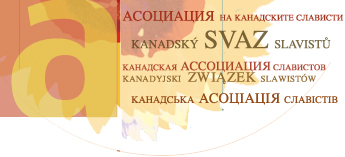
The Canadian Association of Slavists was founded in 1954 in order
to address specifically Canadian problems facing the profession.
Its predecessor, the American Association of Teachers of Slavic
and East European Languages (AATSEEL) of Canada, had been organized
at the University of Toronto in 1947.
The landscape of Slavic studies in Canada has changed radically
since the inception of the CAS. On the one hand, Slavic disciplines
have been affected by the political changes sweeping Europe since
the mid 1980's. These changes have led to the growth of many areas—among
them, for example, Ukrainian studies. These changes have also predicated
the need of addressing specific aspects of Slavic studies within
more specialized learned societies. On the other hand, beginning
with the mid 1990's, the humanities have faced tremendous financial
constraints. To cite only one example, the
Social Sciences and Humanities Federation of Canada (SSHRC) stopped
providing travel grants to those learned societies seeking to attend
the Congress of the Humanities and Social Sciences, which had joined
the Canadian Federation for the Humanities and Social Sciences
(CFHSS) after 1996-97.
The CAS recognizes that a diversity of associations can only
enrich the profession. New, small societies that address specific
scholarly priorities have the potential of fostering innovation.
However, the CAS believes that a coalition of inquiry serving all
Slavists is still necessary. Such a coalition can better represent
our collective perspective at the CFHSS, whose function it is to
garner support from the Canadian government toward scholarly endeavors
in the humanities. This, in turn, can positively affect the manner
in which the SSHRC lends its support to societies such as the CAS.
For these reasons, the CAS cordially invites other learned societies
of Slavists to become affiliate members. The relationship, we posit,
can be mutually beneficial. For more information, please contact
any one member of the current CAS executive.
Learned Societies affiliated with the CAS
The Canadian Association for Ukrainian Studies (CAUS) was
created on the basis of the Conference on Ukrainian Studies (CUF),
which had a long standing relationship with the CAS. A poll—conducted
among the CUF in the fall of 2000—resulted in 91.5% of participating
respondents voting to create the CAUS as an autonomous affiliate
of the CAS. In 2002 there was broad participation by Ukrainianists
in numerous panels of the CAS at its annual conference, which was
being held at the University of Toronto. During this occasion the
CAUS was officially constituted and Roman
Senkus (CIUS Toronto Office) was elected its first
president.
Other members of the CAUS executive include:
Olga Andriewsky (Trent U), Andrij Makuch (CIUS, U of Toronto),
Myroslav Shkandrij (U of Manitoba), Bohdan Kordan (U of Saskatchewan),
Zenon Kohut (CIUS, U of Alberta), Bohdan Harasymiw (U of Calgary),
Maryna Romanets (U of Northern British Columbia), Serhy Yekelchyk
(U of Victoria) and Maxim Tarnawsky (U of Toronto).
The official organ of the CAUS is the Journal of
Ukrainian Studies,
a refereed scholarly publication, which has appeared since
1976 under the aegis of the Canadian Institute of Ukrainian
Studies.
Membership in the CAUS includes annual subscriptions to the Journal of
Ukrainian Studies (at a reduced rate available only to members) and to Canadian Slavonic Papers. To
join the CAUS, membership in the CAS is required. For more information,
click on Become a Member of the CAS.
|
